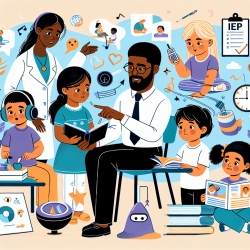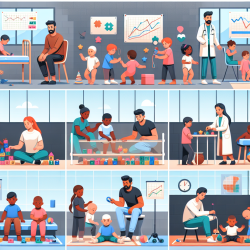Understanding the Intersection of Racism and Health Equity
In the field of speech-language pathology, practitioners are often focused on enhancing communication abilities in children. However, understanding the broader context of health equity and the social determinants of health is crucial for creating truly inclusive and effective therapeutic interventions. The research article "Racism as a Threat to Palestinian Health Equity" by Asi et al. (2024) provides a profound exploration of how racism, particularly structural racism, impacts health outcomes. This blog post aims to encourage practitioners to integrate these insights into their practice and consider further research in this domain.
Key Findings from the Research
The research highlights that racism is not merely a social issue but a significant determinant of health. The authors argue that structural racism underpins the health inequities faced by Palestinians, manifesting in various forms such as limited access to healthcare, poor health outcomes, and significant mental health burdens. These inequities are exacerbated by the geopolitical dynamics and historical injustices faced by the Palestinian population.
For practitioners in speech-language pathology, this underscores the importance of recognizing how social determinants, including racism, can affect the populations we serve. It is vital to understand that children from marginalized communities may face additional barriers to accessing quality healthcare, which can impact their communication development and overall health.
Practical Implications for Practitioners
Practitioners can take several steps to integrate these insights into their practice:
- Advocate for Health Equity: Use your position to advocate for policies that promote equitable access to healthcare services. This includes supporting initiatives that address the social determinants of health.
- Educate and Raise Awareness: Educate yourself and others about the impact of structural racism on health outcomes. Raising awareness within your professional community can lead to more informed and sensitive practice.
- Engage in Culturally Competent Practice: Develop and implement culturally competent interventions that consider the unique social and cultural contexts of the children you serve.
- Conduct Further Research: Engage in or support research that explores the intersection of race, health, and communication disorders. This can help build a more comprehensive understanding of how these factors interact.
Encouraging Further Research
While the research by Asi et al. provides valuable insights, there is a need for further exploration into how these dynamics specifically affect communication disorders. Practitioners are encouraged to collaborate with researchers to investigate these intersections and contribute to a more nuanced understanding of health equity in speech-language pathology.
Conclusion
Incorporating the findings from "Racism as a Threat to Palestinian Health Equity" into practice can significantly enhance the effectiveness of interventions and promote better health outcomes for children. By understanding and addressing the broader social determinants of health, practitioners can play a crucial role in advancing health equity.
To read the original research paper, please follow this link: Racism as a Threat to Palestinian Health Equity.










